Culinary events in historic mansions are specialized gatherings that merge fine dining with the rich ambiance and historical significance of these architectural landmarks. These events feature gourmet meals prepared by renowned chefs, often utilizing traditional recipes and locally sourced ingredients, while providing an immersive experience that connects guests to the culinary traditions of the past. The unique features of historic mansions, such as grand architectural designs and expansive dining spaces, enhance the overall dining experience, making these events popular among food enthusiasts and history lovers alike. Additionally, the article explores the organization, challenges, and future trends of culinary events in these venues, highlighting their cultural significance and the role of sustainability and technology in modern dining experiences.
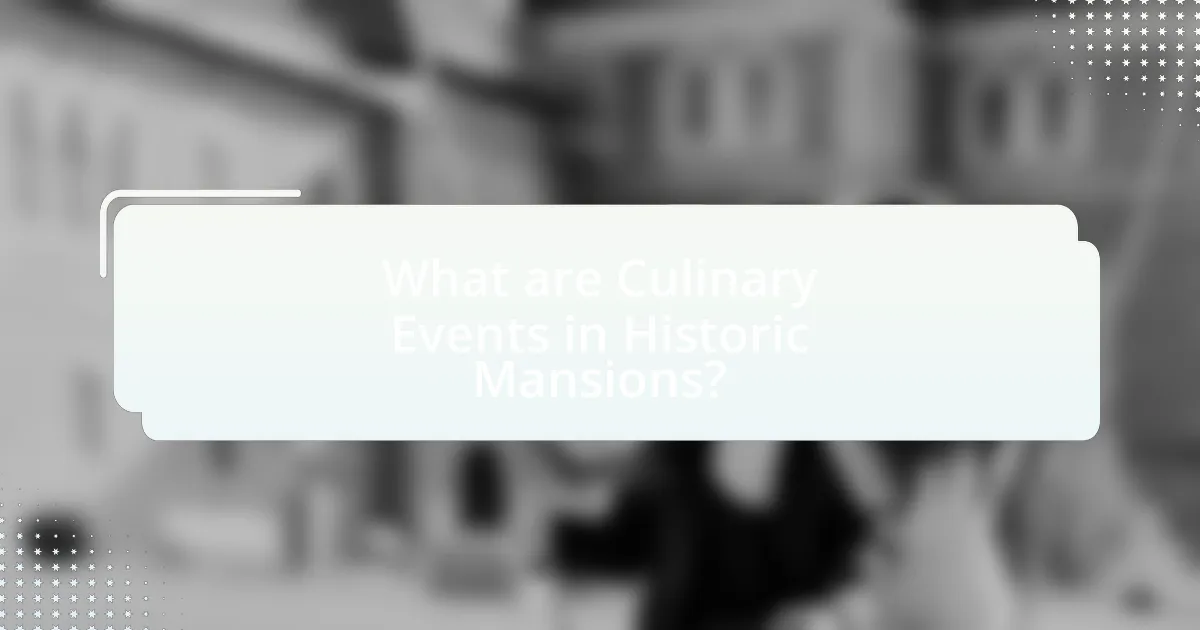
What are Culinary Events in Historic Mansions?
Culinary events in historic mansions are specialized gatherings that combine fine dining experiences with the unique ambiance and historical significance of these architectural landmarks. These events often feature gourmet meals prepared by renowned chefs, utilizing traditional recipes or locally sourced ingredients, and are designed to immerse guests in the culinary traditions of the past. Historic mansions, such as those from the Victorian or Colonial eras, provide a rich backdrop that enhances the dining experience, often including guided tours or storytelling that connect the food to the mansion’s history.
How do Culinary Events in Historic Mansions differ from other culinary experiences?
Culinary events in historic mansions differ from other culinary experiences primarily due to their unique blend of historical ambiance and curated dining experiences. These events often take place in architecturally significant settings that date back centuries, providing a rich backdrop that enhances the overall dining experience. For instance, the grandeur of a Victorian mansion or the elegance of a Georgian estate can evoke a sense of nostalgia and connection to the past, which is not typically found in modern dining venues. Additionally, many of these events incorporate traditional recipes and cooking techniques that reflect the culinary heritage of the era, offering guests a taste of history alongside their meals. This combination of historical context and culinary artistry creates a distinctive experience that sets culinary events in historic mansions apart from standard dining options.
What unique features do historic mansions offer for culinary events?
Historic mansions offer unique features for culinary events, including grand architectural designs, expansive dining spaces, and rich historical ambiance. These mansions often have large ballrooms or dining halls that can accommodate significant numbers of guests, enhancing the social experience of culinary gatherings. Additionally, the historical significance of these venues adds a narrative element to events, allowing guests to engage with the past while enjoying gourmet meals. Many historic mansions also feature original kitchens or catering facilities that can be adapted for modern culinary needs, providing a blend of tradition and contemporary service. The combination of these elements creates an unforgettable atmosphere that elevates culinary events beyond standard venues.
How does the ambiance of a historic mansion enhance the dining experience?
The ambiance of a historic mansion significantly enhances the dining experience by providing a unique and immersive atmosphere that reflects the elegance and charm of a bygone era. This setting often features ornate architecture, period furnishings, and rich historical narratives that engage diners on multiple sensory levels. For instance, the presence of antique decor and original artwork can evoke a sense of nostalgia and connection to history, making the meal feel more special and memorable. Additionally, the acoustics and lighting in such spaces can create an intimate environment, fostering conversation and enjoyment among guests. Studies have shown that dining in aesthetically pleasing environments can lead to increased satisfaction and perceived quality of food, further validating the impact of a historic mansion’s ambiance on the overall dining experience.
Why are Culinary Events in Historic Mansions popular?
Culinary events in historic mansions are popular due to their unique blend of gastronomy and rich historical ambiance. These events offer attendees an immersive experience that combines fine dining with the charm and elegance of architectural heritage, often set in beautifully preserved environments that enhance the overall dining experience. The allure of historic mansions, many of which date back centuries, provides a captivating backdrop that elevates the culinary offerings, making them more memorable. Additionally, the exclusivity and sophistication associated with such venues attract food enthusiasts and socialites, further driving interest in these events.
What cultural significance do these events hold?
Culinary events in historic mansions hold significant cultural importance as they serve to preserve and celebrate culinary traditions and heritage. These events often showcase regional cuisines, reflecting the historical context and social customs of the time, thereby fostering a deeper understanding of cultural identity. For instance, events that feature traditional recipes passed down through generations highlight the importance of food in cultural storytelling and community bonding. Additionally, they provide an opportunity for participants to engage with history in a tangible way, enhancing appreciation for the culinary arts as a vital aspect of cultural heritage.
How do culinary events in historic mansions attract diverse audiences?
Culinary events in historic mansions attract diverse audiences by offering unique experiences that blend gastronomy with cultural heritage. These events often feature local chefs who create menus inspired by historical recipes, appealing to food enthusiasts and history buffs alike. Additionally, the ambiance of a historic mansion enhances the dining experience, drawing in individuals seeking both aesthetic pleasure and a sense of nostalgia. Research indicates that events held in unique venues can increase attendance by up to 30%, as they provide an immersive environment that standard venues cannot replicate. This combination of culinary artistry and historical significance effectively engages a wide range of participants, from families to tourists, fostering a community around shared interests in food and history.
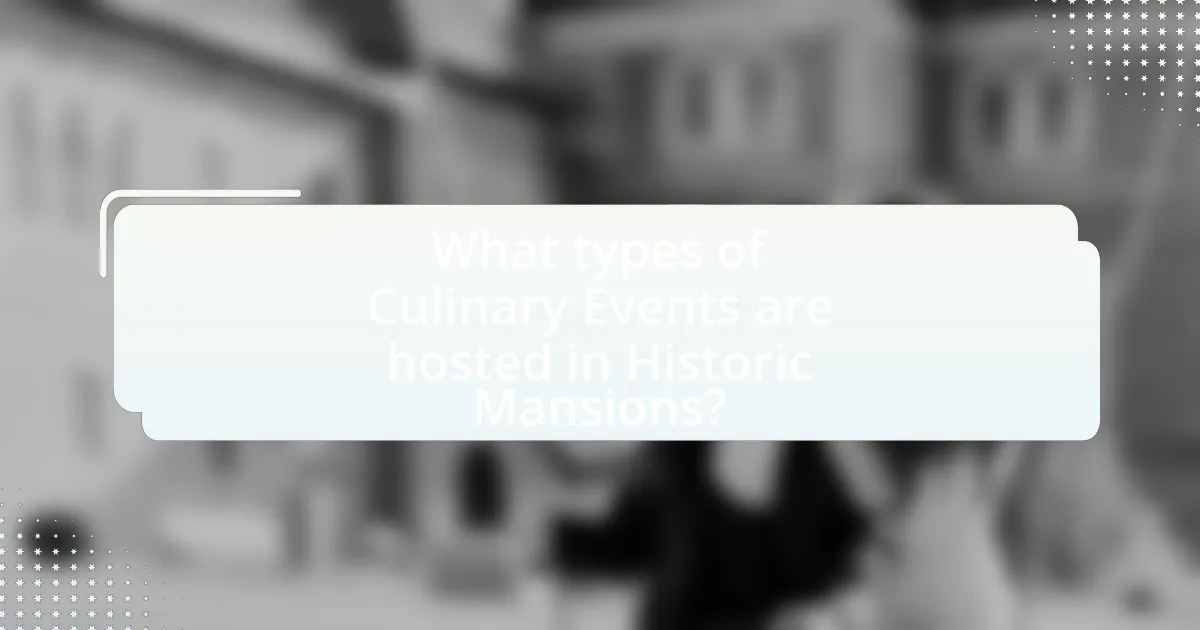
What types of Culinary Events are hosted in Historic Mansions?
Historic mansions host a variety of culinary events, including formal dinners, wine tastings, cooking classes, and themed banquets. These events often leverage the unique ambiance and historical significance of the venues to enhance the dining experience. For instance, formal dinners may feature multi-course meals inspired by historical recipes, while wine tastings can showcase local vineyards in a setting that reflects the mansion’s era. Cooking classes often incorporate traditional techniques and ingredients, allowing participants to engage with the culinary history of the region. The combination of exquisite cuisine and the architectural beauty of historic mansions creates a distinctive atmosphere that attracts food enthusiasts and history lovers alike.
What are the most common types of culinary events held in these venues?
The most common types of culinary events held in historic mansions include wine tastings, gourmet dinners, cooking classes, and themed food festivals. These events leverage the unique ambiance and historical significance of the venues to enhance the culinary experience. For instance, wine tastings often feature local vineyards and are designed to educate participants about wine pairings, while gourmet dinners typically showcase seasonal ingredients prepared by renowned chefs, creating a memorable dining experience that reflects the mansion’s heritage. Cooking classes provide hands-on learning opportunities, allowing participants to engage with culinary traditions in a historic setting. Themed food festivals often celebrate specific cuisines or historical periods, attracting food enthusiasts and promoting cultural appreciation.
How do themed dinners differ from traditional dining events?
Themed dinners differ from traditional dining events primarily in their focus on a specific concept or narrative that shapes the entire dining experience. While traditional dining events typically emphasize the meal itself without a unifying theme, themed dinners incorporate elements such as decor, menu items, and entertainment that align with a particular motif, enhancing the overall atmosphere. For example, a themed dinner might revolve around a historical period, featuring period-appropriate dishes and costumes, which creates an immersive experience that engages guests beyond just the food. This approach not only entertains but also educates attendees about the theme, making it a more interactive and memorable occasion.
What role do wine tastings play in culinary events at historic mansions?
Wine tastings serve as a central feature in culinary events at historic mansions by enhancing the overall dining experience and connecting guests to the mansion’s historical context. These tastings often showcase wines that reflect the region’s heritage, allowing participants to appreciate the flavors that may have been enjoyed by past residents. For instance, many historic mansions have curated wine selections that align with the culinary traditions of their time, providing an authentic taste of history. This integration of wine tastings not only elevates the gastronomic aspect of the event but also fosters a deeper understanding of the mansion’s cultural significance, making the experience both educational and enjoyable for attendees.
How are Culinary Events in Historic Mansions organized?
Culinary events in historic mansions are organized through a structured process that involves venue selection, menu planning, and coordination of logistics. The venue, typically a historic mansion, is chosen for its ambiance and historical significance, which enhances the dining experience. Menu planning incorporates local and seasonal ingredients, often reflecting the culinary traditions of the mansion’s era, ensuring authenticity. Logistics include arranging for catering services, staffing, and event setup, while also considering the mansion’s preservation guidelines to maintain its integrity. This organization process is crucial for creating an immersive experience that connects guests with the mansion’s history and culinary heritage.
What steps are involved in planning a culinary event in a historic mansion?
Planning a culinary event in a historic mansion involves several key steps. First, identify the mansion’s availability and suitability for the event, considering its capacity and facilities. Next, establish a budget that includes venue rental, catering, decorations, and permits. Following this, select a theme that complements the mansion’s historical context, which can enhance the overall experience.
Then, coordinate with a reputable catering service that can provide a menu aligned with the theme and dietary preferences of guests. Additionally, arrange for necessary permits and insurance, as historic venues may have specific regulations. After that, focus on logistics such as seating arrangements, audio-visual equipment, and transportation for guests.
Finally, promote the event through appropriate channels to attract attendees, ensuring that the mansion’s unique features are highlighted in marketing materials. Each of these steps is crucial for a successful culinary event that respects the mansion’s heritage while providing an enjoyable experience.
How do event planners ensure the preservation of the mansion’s integrity during events?
Event planners ensure the preservation of the mansion’s integrity during events by implementing strict guidelines and protocols tailored to the historic structure. These planners often conduct thorough assessments of the mansion’s features and limitations, ensuring that any modifications or decorations are temporary and non-invasive. For instance, they may use protective coverings on floors and furniture, and avoid using adhesives that could damage surfaces. Additionally, they often limit the number of guests to reduce wear and tear, and provide staff trained in handling historic properties to oversee the event. This approach is supported by preservation standards set by organizations like the National Trust for Historic Preservation, which emphasize the importance of maintaining the original character and materials of historic sites during events.
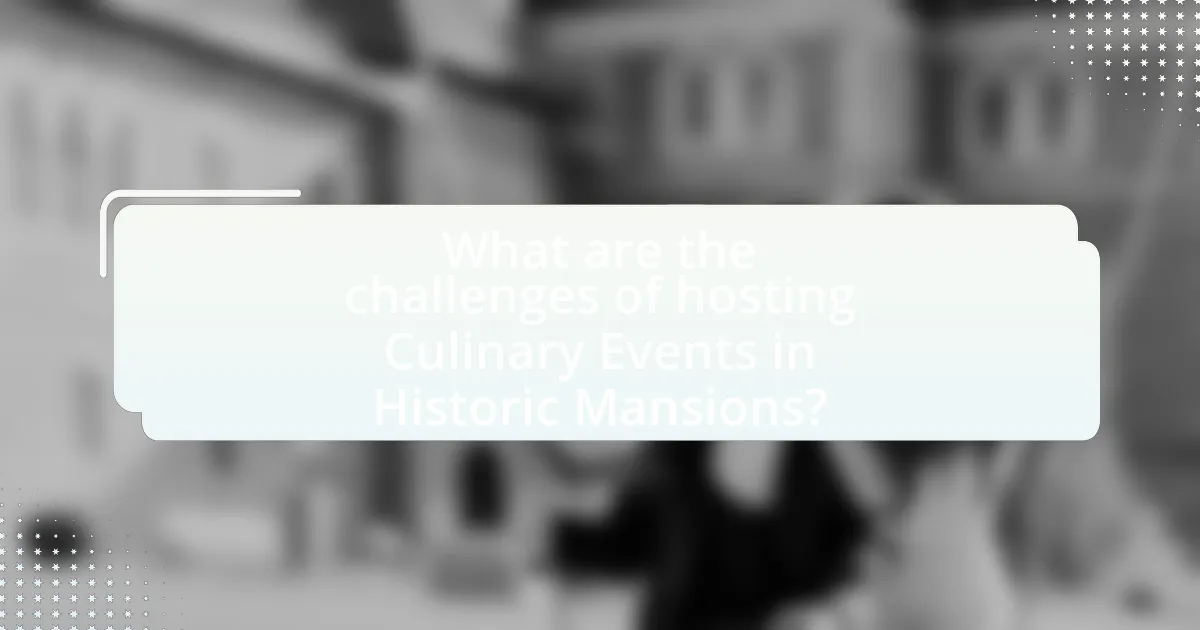
What are the challenges of hosting Culinary Events in Historic Mansions?
Hosting culinary events in historic mansions presents several challenges, primarily related to logistical constraints, preservation concerns, and regulatory compliance. Logistical constraints arise from limited kitchen facilities and outdated infrastructure, which can hinder food preparation and service. Preservation concerns involve maintaining the integrity of the mansion’s historical features, as heavy equipment or large gatherings may cause damage. Regulatory compliance is often complicated by local laws regarding food service and occupancy limits, which can restrict the number of guests and the types of activities allowed. These factors collectively complicate the planning and execution of culinary events in such venues.
What logistical issues arise when organizing events in historic venues?
Organizing events in historic venues presents several logistical issues, primarily related to accessibility, infrastructure limitations, and regulatory compliance. Accessibility can be a significant challenge, as many historic buildings lack modern amenities such as elevators or ramps, making it difficult for individuals with mobility impairments to navigate the space. Infrastructure limitations often include inadequate electrical systems, insufficient restroom facilities, and restricted loading areas, which can complicate the setup and execution of events. Additionally, regulatory compliance is crucial, as historic venues may have specific preservation laws and guidelines that dictate what alterations can be made, impacting event planning and execution. These factors collectively create a complex environment for event organizers, necessitating careful planning and coordination to ensure a successful event.
How do restrictions on renovations impact event planning?
Restrictions on renovations significantly impact event planning by limiting the ability to modify spaces to meet specific event needs. For instance, historical preservation laws often prevent alterations that could enhance functionality or aesthetics, such as installing modern kitchen facilities or improving accessibility. These limitations can lead to challenges in accommodating guests, catering requirements, and overall event logistics, ultimately affecting the success and experience of culinary events held in historic mansions.
What are the common safety concerns associated with hosting events in historic mansions?
Common safety concerns associated with hosting events in historic mansions include structural integrity, fire hazards, and accessibility issues. Historic mansions often have outdated electrical systems that may not support modern equipment, increasing the risk of electrical fires. Additionally, the age of the building can lead to concerns about the stability of floors and ceilings, particularly in areas with heavy foot traffic. Furthermore, many historic mansions lack proper accessibility features, making it difficult for individuals with disabilities to navigate the space safely. These factors necessitate thorough safety assessments and compliance with current safety regulations to mitigate risks during events.
How can these challenges be overcome?
To overcome challenges in organizing culinary events in historic mansions, event planners should prioritize collaboration with preservation experts and local authorities. This collaboration ensures compliance with regulations that protect the integrity of the historic site while allowing for necessary adaptations to accommodate modern culinary practices. For instance, the National Trust for Historic Preservation emphasizes the importance of balancing preservation with contemporary use, highlighting successful case studies where adaptive reuse has been implemented effectively. Additionally, engaging local chefs who specialize in historical cuisine can enhance authenticity and attract attendees, as evidenced by events like the Historic Foodways program, which showcases traditional cooking methods and ingredients.
What best practices can be implemented for successful event management?
Successful event management can be achieved by implementing thorough planning, effective communication, and detailed budgeting. Thorough planning involves setting clear objectives, creating a timeline, and identifying potential challenges, which ensures that all aspects of the event are considered and organized. Effective communication among team members and stakeholders fosters collaboration and minimizes misunderstandings, leading to a smoother execution of the event. Detailed budgeting is crucial as it helps allocate resources efficiently, ensuring that all necessary expenses are covered while avoiding overspending. According to a study by the Event Marketing Institute, 79% of event planners believe that a well-structured budget is essential for event success, highlighting the importance of these best practices in achieving successful outcomes in event management.
How can collaboration with local authorities facilitate smoother events?
Collaboration with local authorities can facilitate smoother events by ensuring compliance with regulations and providing necessary resources. Local authorities often have established protocols for event planning, which can streamline the permitting process and reduce delays. For instance, they can assist in traffic management, security arrangements, and health and safety compliance, which are critical for large gatherings. Additionally, local authorities may offer logistical support, such as access to public facilities and services, which can enhance the overall experience for attendees. This collaboration can lead to more efficient use of resources and improved communication, ultimately resulting in a successful event.
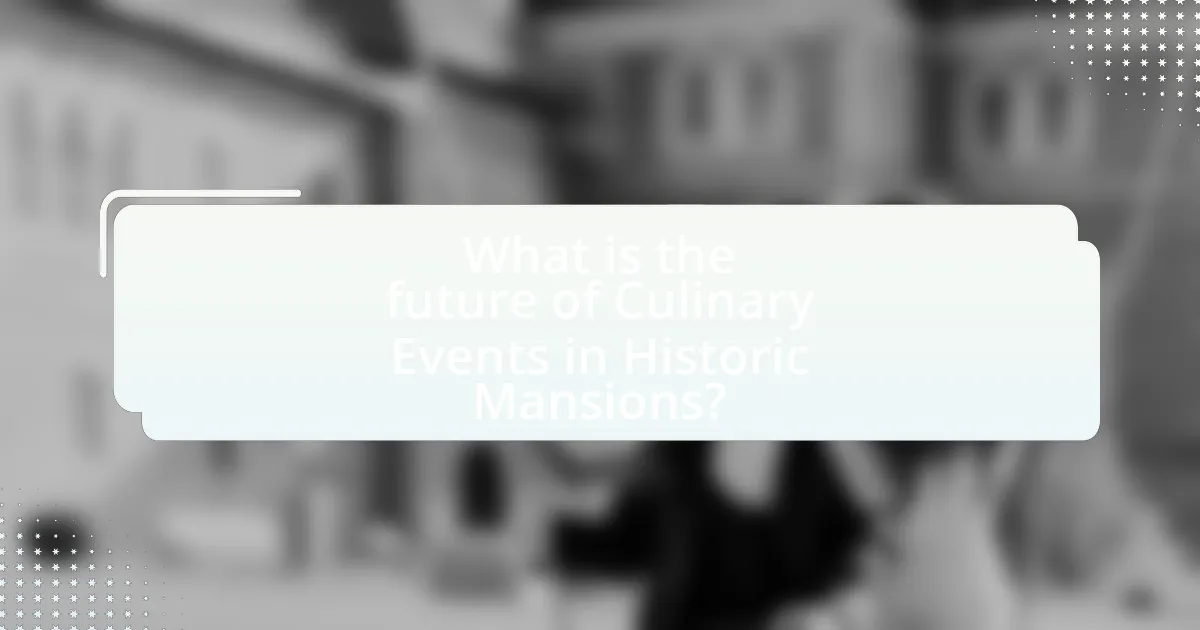
What is the future of Culinary Events in Historic Mansions?
The future of culinary events in historic mansions is poised for growth, driven by increasing interest in unique dining experiences and heritage tourism. As consumers seek immersive experiences that combine gastronomy with history, historic mansions are becoming sought-after venues for exclusive culinary events. According to a report by the National Trust for Historic Preservation, events held in historic settings can enhance guest engagement and appreciation for cultural heritage, leading to a rise in bookings for such venues. Additionally, partnerships with local chefs and culinary schools are likely to flourish, creating innovative menus that reflect both the history of the mansion and contemporary culinary trends. This trend indicates a sustainable future for culinary events in these unique locations, blending the past with modern dining experiences.
How are trends in culinary events evolving in historic settings?
Trends in culinary events are evolving in historic settings by increasingly incorporating immersive experiences that blend gastronomy with historical narratives. Event organizers are now focusing on creating thematic dining experiences that reflect the cultural and historical significance of the venue, such as using traditional recipes or locally sourced ingredients that were prevalent during the period the mansion represents. For instance, a recent trend involves hosting farm-to-table dinners in historic estates, where chefs prepare meals inspired by the original inhabitants’ culinary practices, enhancing the authenticity of the experience. This evolution is supported by a growing consumer interest in experiential dining, as evidenced by a 2022 survey from the National Restaurant Association, which indicated that 70% of diners prefer unique experiences over traditional dining.
What role does technology play in modern culinary events at historic mansions?
Technology enhances modern culinary events at historic mansions by improving efficiency, presentation, and guest engagement. For instance, advanced kitchen equipment allows chefs to prepare intricate dishes with precision, while digital platforms facilitate seamless event planning and coordination. Additionally, audiovisual technology creates immersive dining experiences, allowing guests to enjoy interactive elements such as live cooking demonstrations or virtual reality tours of the mansion’s history. These technological advancements not only elevate the culinary experience but also preserve the integrity and ambiance of the historic setting, ensuring that the events resonate with both tradition and modernity.
How can sustainability be integrated into culinary events in historic venues?
Sustainability can be integrated into culinary events in historic venues by utilizing locally sourced ingredients, minimizing waste, and implementing eco-friendly practices. By sourcing ingredients from local farms, events can reduce carbon footprints associated with transportation and support regional economies. Additionally, employing composting and recycling programs can significantly decrease waste generated during events. Historic venues can also adopt energy-efficient lighting and equipment to lower energy consumption. These practices not only preserve the environment but also enhance the authenticity of the culinary experience by connecting guests to the local culture and history.
What tips can enhance the experience of Culinary Events in Historic Mansions?
To enhance the experience of culinary events in historic mansions, focus on integrating the mansion’s historical elements with the culinary offerings. This can be achieved by curating a menu that reflects the era of the mansion, using locally sourced ingredients to create authentic dishes that resonate with the mansion’s history. For instance, if the mansion dates back to the Victorian era, incorporating traditional Victorian recipes can create a cohesive experience. Additionally, offering guided tours that highlight the mansion’s architecture and history before or after the meal can deepen guests’ appreciation for the setting. Engaging storytelling during the event, such as sharing anecdotes about the mansion’s past or notable figures associated with it, can further enrich the experience. These strategies not only celebrate the culinary arts but also honor the historical significance of the venue, creating a memorable event for attendees.
How can guests make the most of their culinary experience in a historic mansion?
Guests can make the most of their culinary experience in a historic mansion by engaging in themed dining events that reflect the mansion’s history and culinary traditions. Participating in these events allows guests to savor authentic dishes prepared using traditional recipes and techniques, often sourced from local ingredients that were historically available in the region. For example, many historic mansions offer seasonal menus that highlight the flavors of the era in which the mansion was built, providing a unique insight into the past. Additionally, guests can enhance their experience by attending guided tours that explain the historical significance of the mansion’s architecture and its culinary heritage, thereby deepening their appreciation for the meal.
What should event organizers consider to create memorable culinary experiences?
Event organizers should consider the integration of local and seasonal ingredients to create memorable culinary experiences. Utilizing fresh, regionally sourced produce not only enhances flavor but also supports local farmers and reflects the cultural heritage of the area. For instance, a study by the Culinary Institute of America highlights that menus featuring local ingredients can increase guest satisfaction by up to 30%. Additionally, incorporating storytelling elements related to the historic mansion’s past can deepen the dining experience, as guests often appreciate the connection between food and history. This approach not only enriches the culinary offering but also creates a unique atmosphere that resonates with attendees.
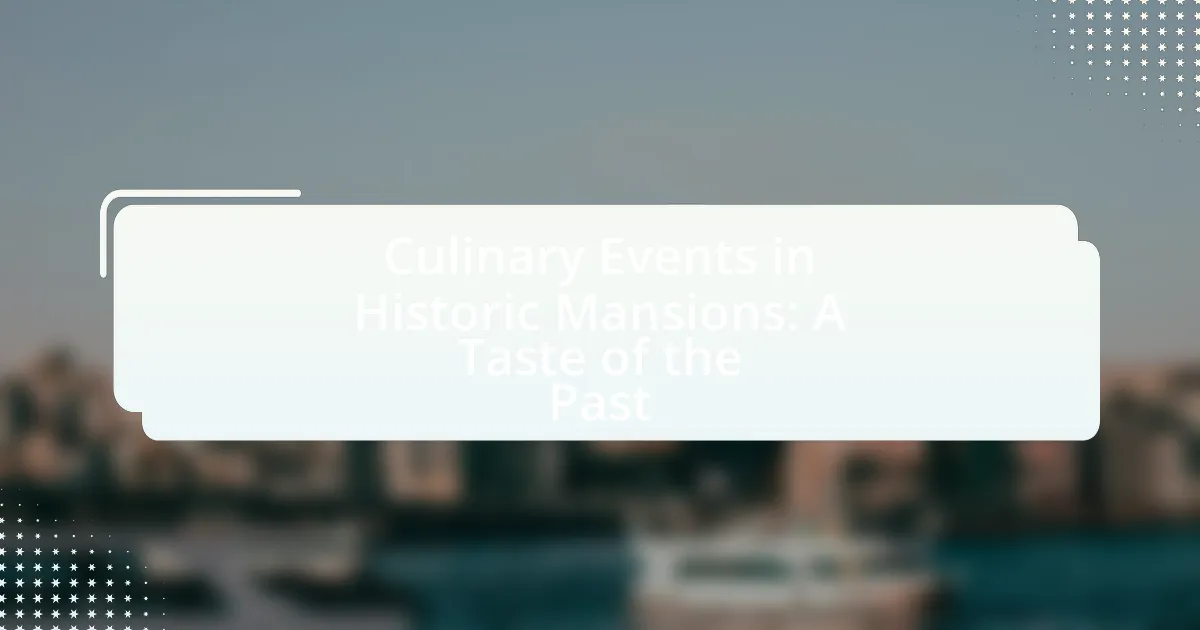
Leave a Reply